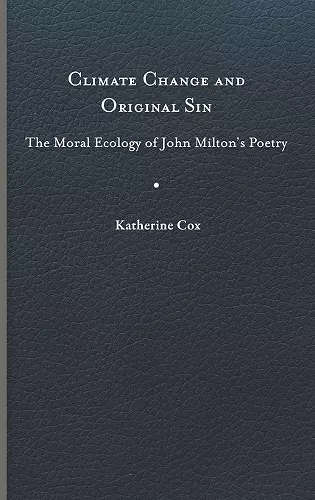Climate Change and Original Sin
The Moral Ecology of John Milton's Poetry
Format:Hardback
Publisher:University of Virginia Press
Published:16th Jun '23
Currently unavailable, and unfortunately no date known when it will be back

Prior to the Enlightenment era, how was the human-climate relationship conceived? Focusing on the most recent epoch in which belief in an animate environment still widely prevailed, Climate Change and Original Sin argues that an ecologically inflected moral system assumed that humanity bore responsibility for climate corruption and volatility.
The environmental problem initiated by original sin is not only that humans alienated themselves from nature but also that satanic powers invaded the world and corrupted its elements—particularly the air. Milton shared with contemporaries the widespread view that storms and earthquakes represented the work of fearsome spiritual agents licensed to inflict misery on humans as penalty for sin. Katherine Cox’s work discerns in Paradise Lost an ecological fall distinct from, yet concurrent with, the human fall. In examining Milton’s evolving representations of the climate, this book also traces the gradual development of ideas about the atmosphere during the seventeenth century—a change in the intellectual climate driven by experimental activity and heralding an ecologically devastating shift in Western attitudes toward the air.
“A major contribution to the critical understanding of early modern notions of climate and climate change. This is an extremely impressive work of scholarship, and one of the very best works on Milton in recent years. Thorough, creative, and compelling.” - Christopher Kendrick, Loyola University Chicago, author of Milton: A Study in Ideology and Form
“A highly original, well researched, and impressively informative study full of bracing surprises and rich in fresh insights into Milton’s poetry, place, and times. Cox’s book embodies a thoroughgoing, detailed, and ultimately convincing insistence on the importance and interconnectedness for Milton (and beyond) of climate, meteorology, pneumatology, air, airs, winds, spirits, inspirations, exhalations, voices, and music.” - Dennis Danielson, University of British Columbia, author of Milton's Good God: A Study in Literary Theodicy
ISBN: 9780813949734
Dimensions: unknown
Weight: 272g
272 pages